Wednesday, July 26, 2006
SUNSHINE!!
Ah…. Sunshine! Finally! How we missed it during the LONG rainy season this year? I was so sick of rain. For the past couple of weeks, when I woke up in the morning, my first thought was, “Gosh, I have to go to work riding my bicycle in the rain AGAIN, and the rain coat is still wet!”
Well, off to work now…
Well, off to work now…
Friday, July 21, 2006
OLD AND NEW ...
I spent the long weekend in my hometown where people celebrate obon then. (More precisely, obon was from July 13th to 16th). If you’re interested in how we celebrate obon at my parents’ house, click here.
Usually I take a train halfway and then a bus to go to Muroto. The train is a special one with a deck, and passengers can enjoy the coastal view from there when the weather is nice. This time I managed to take several shots there.
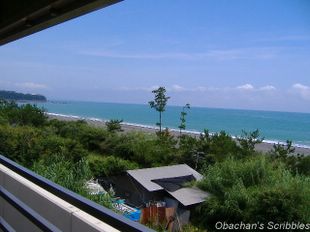
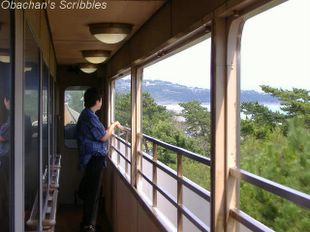
Back in my hometown, I had a chance to walk by the elementary school that I went to. Mom told me that it was officially closed last April, and people are now discussing what they should use the building for. It’s sad.
On the other hand, the small fishing port was equipped with modern machines that I had never seen in my childhood.



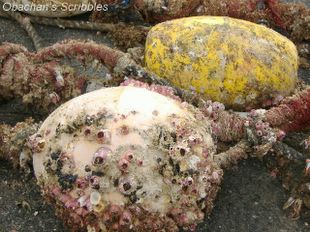
Something old and something new -- they always co-exist in small, underpopulated areas in countryside. It is because the local government tries hard to boost the local economy in every possible way while the old folks continue the fishing and farming work that their grandparents were doing there. They enthusiastically advertise “the local specialty,” and in case of Muroto, it is deep sea water. Now in my hometown, deep sea water is used in almost all food products that use water as an ingredient or that are boiled or washed with it. Oh, not just food products. Shu Uemura has a factory there to make lotions made with deep sea water.
And this summer, they opened thalasotherapy facilities that use deep sea water for the therapy. The place called “deep sea world” near the cape Muroto consists of basically two facilities: "Utoco Deep Sea Therapy Center & Hotel" run by Shu Uemura and "Bade Haus Muroto" run by the city (if I'm not mistaken.) The former is an expensive esthetic treatment center with accommodation facilities, and the latter is more like a fitness gym with no workout machines but “Bade pool” which is specially designed for water exercises, water massage, etc. And of course, the pools in both facilities are filled with deep sea water.


The Deep Sea World is about 10 minutes drive from my parents’ house. According to mom and her friend, the Bade Haus is already quite popular among the obachans in nearby towns because the water exercise is refreshing and kind to their joints, and the fee is not terribly expensive. But they are scared to try the expensive “esthetic treatment” at UTOCO. :D
Unfortunately I didn’t have time to try the bade pool this time, but maybe next time…
 I’m really interested in how these new attempts are going to affect the future of my hometown and the people living there. The water exercise in deep sea water may extend their life expectancy even more (!) (I'm not kidding. A recent report says that deep sea water can suppress helicobacter pylori.) The elder people in my hometown looked already pretty old to me when I was a kid. In my childhood memories, they were always working in the field wearing typical farmers’ outfit. And now the same grandpas and grandmas in the same outfit may work in the field the same way as before, and also enjoy floating in the ultramodern therapeutic pool once in a while. It sounds kind of funny to me, but I like it. And I guess the same blue sky and the blue ocean in my hometown will remain the same for a long, long time, laughing at the small efforts we make one after another in such a short span of time from their point of view. :)
I’m really interested in how these new attempts are going to affect the future of my hometown and the people living there. The water exercise in deep sea water may extend their life expectancy even more (!) (I'm not kidding. A recent report says that deep sea water can suppress helicobacter pylori.) The elder people in my hometown looked already pretty old to me when I was a kid. In my childhood memories, they were always working in the field wearing typical farmers’ outfit. And now the same grandpas and grandmas in the same outfit may work in the field the same way as before, and also enjoy floating in the ultramodern therapeutic pool once in a while. It sounds kind of funny to me, but I like it. And I guess the same blue sky and the blue ocean in my hometown will remain the same for a long, long time, laughing at the small efforts we make one after another in such a short span of time from their point of view. :)
Categories: Kochi
Usually I take a train halfway and then a bus to go to Muroto. The train is a special one with a deck, and passengers can enjoy the coastal view from there when the weather is nice. This time I managed to take several shots there.


View from JR Train (Gomen-Nahari Line)
On the other hand, the small fishing port was equipped with modern machines that I had never seen in my childhood.

But the boats were exactly the same as before. Believe it or not, elementary school kids swam in this fishing port in my childhood. Of course I did, too. Our school didn't have a swimming pool.



And this summer, they opened thalasotherapy facilities that use deep sea water for the therapy. The place called “deep sea world” near the cape Muroto consists of basically two facilities: "Utoco Deep Sea Therapy Center & Hotel" run by Shu Uemura and "Bade Haus Muroto" run by the city (if I'm not mistaken.) The former is an expensive esthetic treatment center with accommodation facilities, and the latter is more like a fitness gym with no workout machines but “Bade pool” which is specially designed for water exercises, water massage, etc. And of course, the pools in both facilities are filled with deep sea water.

UTOCO Deep Sea Water Therapy Center & Hotel

Bade Haus MUROTO (Is "bade haus" a German thing??)
Unfortunately I didn’t have time to try the bade pool this time, but maybe next time…
 I’m really interested in how these new attempts are going to affect the future of my hometown and the people living there. The water exercise in deep sea water may extend their life expectancy even more (!) (I'm not kidding. A recent report says that deep sea water can suppress helicobacter pylori.) The elder people in my hometown looked already pretty old to me when I was a kid. In my childhood memories, they were always working in the field wearing typical farmers’ outfit. And now the same grandpas and grandmas in the same outfit may work in the field the same way as before, and also enjoy floating in the ultramodern therapeutic pool once in a while. It sounds kind of funny to me, but I like it. And I guess the same blue sky and the blue ocean in my hometown will remain the same for a long, long time, laughing at the small efforts we make one after another in such a short span of time from their point of view. :)
I’m really interested in how these new attempts are going to affect the future of my hometown and the people living there. The water exercise in deep sea water may extend their life expectancy even more (!) (I'm not kidding. A recent report says that deep sea water can suppress helicobacter pylori.) The elder people in my hometown looked already pretty old to me when I was a kid. In my childhood memories, they were always working in the field wearing typical farmers’ outfit. And now the same grandpas and grandmas in the same outfit may work in the field the same way as before, and also enjoy floating in the ultramodern therapeutic pool once in a while. It sounds kind of funny to me, but I like it. And I guess the same blue sky and the blue ocean in my hometown will remain the same for a long, long time, laughing at the small efforts we make one after another in such a short span of time from their point of view. :)Categories: Kochi
Friday, July 14, 2006
MY DAYTIME WORK
I haven’t written about this before, but now I feel like sharing a little more about the job I do in the daytime. I have a lot to say about the issues in this field, especially now that I’m taking a course to pursue a better job opportunity there. Ten afternoons a month, I work as an input operator at what they call a “herupaa steeshon” which is “helper station” pronounced in Japanese way. This name probably means something different in other English speaking countries. Here in Japan, it’s supposed to mean the agency that send home-care workers who take care of the elderly.
My job basically is to input the hours the home-care workers worked, and in the beginning of the month, send the monthly data to the government to ask them to send us money. In doing so, I have to witness, whether I like it or not, the struggles that people in this field -- and this country as a whole – are going through.
The elderly care is an urgent issue here in Japan, perhaps more seriously so than in other countries. We have the longest average life expectancy with very low birth rate. The negative effect of the shrinking population on the economy is often talked about, but another threat is the days to come when the elderly have to be largely in charge of elderly care because of the shortage of young workers. So we just have to feel our way to face this problem. What we are doing right now may serve as an example of what not to do for other countries facing more or less the same problem. If we make a big mistake, I hope other countries learn from it and avoid making the same mistake. I mean it.
Seven years ago, the whole world was terrified by the Y2K problem. Now here in Japan, people are talking about the Y2015 problem. Is it the year when elder people start crashing computers throughout Japan? No. It’s the year when all(?) the baby boomers in Japan turn above 65 y.o. and the percentage of “the elderly” is expected to increase dramatically. And ten years later, the majority of them would be in need of some kind of help, which is our Y2025 problem that has nothing to do with the three-digit area codes.
When I was in the U.S. more than 15 years ago, one of the college professors once mentioned about Japan’s elder care and asked me “How are you going to afford that?” Well, Dr. D, we all wish we knew. Japan used to provide free medical care to those above 65 y.o., but not any more. And many say that the lifelong employment is already collapsing in Japan. Now we are going through the birth pain of the new elderly care insurance system, and the pain seems to last quite a while.
More and more companies are coming into this elderly care business, because though it IS a threat, it can be a good business opportunity at the same time. But many of them are facing problems, especially care goods providers. And the government is revising the system and the regulations again and again and again. This year, right now, one big change is taking place, and the computer companies had to update and upgrade the insurance claim software over and over. They had almost no days off during the Golden Week this year, I heard.
I’m not going into details too much here, but I strongly hope that those who talk about Japan’s future, both Japanese and non-Japanese, see what’s REALLY going on in this field. Care managers and home-care workers around me are struggling so hard, trying to do the best they can under the often very unrealistic regulations. It is so touching and it makes me feel that there ARE people who do care. So I really want the lawmakers and advice-givers to see the reality and make things better for such struggling caregivers – no, it is not just for them but “for us,” because we are all going to be old someday.
My job basically is to input the hours the home-care workers worked, and in the beginning of the month, send the monthly data to the government to ask them to send us money. In doing so, I have to witness, whether I like it or not, the struggles that people in this field -- and this country as a whole – are going through.
The elderly care is an urgent issue here in Japan, perhaps more seriously so than in other countries. We have the longest average life expectancy with very low birth rate. The negative effect of the shrinking population on the economy is often talked about, but another threat is the days to come when the elderly have to be largely in charge of elderly care because of the shortage of young workers. So we just have to feel our way to face this problem. What we are doing right now may serve as an example of what not to do for other countries facing more or less the same problem. If we make a big mistake, I hope other countries learn from it and avoid making the same mistake. I mean it.
Seven years ago, the whole world was terrified by the Y2K problem. Now here in Japan, people are talking about the Y2015 problem. Is it the year when elder people start crashing computers throughout Japan? No. It’s the year when all(?) the baby boomers in Japan turn above 65 y.o. and the percentage of “the elderly” is expected to increase dramatically. And ten years later, the majority of them would be in need of some kind of help, which is our Y2025 problem that has nothing to do with the three-digit area codes.
When I was in the U.S. more than 15 years ago, one of the college professors once mentioned about Japan’s elder care and asked me “How are you going to afford that?” Well, Dr. D, we all wish we knew. Japan used to provide free medical care to those above 65 y.o., but not any more. And many say that the lifelong employment is already collapsing in Japan. Now we are going through the birth pain of the new elderly care insurance system, and the pain seems to last quite a while.
More and more companies are coming into this elderly care business, because though it IS a threat, it can be a good business opportunity at the same time. But many of them are facing problems, especially care goods providers. And the government is revising the system and the regulations again and again and again. This year, right now, one big change is taking place, and the computer companies had to update and upgrade the insurance claim software over and over. They had almost no days off during the Golden Week this year, I heard.
I’m not going into details too much here, but I strongly hope that those who talk about Japan’s future, both Japanese and non-Japanese, see what’s REALLY going on in this field. Care managers and home-care workers around me are struggling so hard, trying to do the best they can under the often very unrealistic regulations. It is so touching and it makes me feel that there ARE people who do care. So I really want the lawmakers and advice-givers to see the reality and make things better for such struggling caregivers – no, it is not just for them but “for us,” because we are all going to be old someday.
Wednesday, July 05, 2006
ANYTHING CAN HAPPEN
It was an unbelievably slow night at our kaiseki place last night. Maybe it had something to do with it being Tuesday, a traditionally slow night of the week, and the rain outside. But at around 9 pm, we started wondering if there was something unordinary going on -- something that made people stay at home and glued them to the TV screen. We joked that maybe North Korea fired missiles towards Japan. Well … they actually did, didn’t they? Except it was several hours after our kaiseki place was closed around midnight.
This morning, I woke up because I heard this extremely heavy rain. I tutted and rolled over in bed, thinking about my towels hanging outside on the balcony and the tomato and blueberry plants there with young fruits. The towels can be washed and dried again, so it is not a big problem. But if the young tomatoes and blueberries fell because of the rain, I would be VERY disappointed. The rain was too hard to open the window, so I decided not to check on the plants then and turned on the TV. And there some guys in suits were talking about the Taepodong 2.
The news said the missiles landed in the Sea of Japan, so I knew my plants were not affected by the weapon just like their caretaker wasn’t. After breakfast, I stepped out on the balcony and found that the terrible rainfall didn't harm the young fruits, either. Thank goodness.
But I have to keep this in mind… Anything can happen these days. ANYTHING.
This morning, I woke up because I heard this extremely heavy rain. I tutted and rolled over in bed, thinking about my towels hanging outside on the balcony and the tomato and blueberry plants there with young fruits. The towels can be washed and dried again, so it is not a big problem. But if the young tomatoes and blueberries fell because of the rain, I would be VERY disappointed. The rain was too hard to open the window, so I decided not to check on the plants then and turned on the TV. And there some guys in suits were talking about the Taepodong 2.
The news said the missiles landed in the Sea of Japan, so I knew my plants were not affected by the weapon just like their caretaker wasn’t. After breakfast, I stepped out on the balcony and found that the terrible rainfall didn't harm the young fruits, either. Thank goodness.
But I have to keep this in mind… Anything can happen these days. ANYTHING.
Tuesday, July 04, 2006
CHOBITTO JAPAN VIDEO & SLIDESHOW FESTIVAL
 CHOBITTO JAPAN VIDEO & SLIDESHOW FESTIVAL was held in Kochi city on the evening of July 1st. According to their pamphlet, it “began with a wish, on the part of the foreign residents of Kochi, to share their photographs and video with the community.” The foreign residents take photos and videos in Kochi, which reflect the changes taking place in this rural prefecture, but they are rarely shared with the people in the community. This was an attempt to share them with the local people in an Academiy-Awards-ceremony-like setting. As the title Chobitto Japan indicated, each submission was a three- and-a-half-minute long film/slideshow piece with or without background music, narration, and English/Japanese subtitles. ( "Chobitto" means “just a little bit.”)
CHOBITTO JAPAN VIDEO & SLIDESHOW FESTIVAL was held in Kochi city on the evening of July 1st. According to their pamphlet, it “began with a wish, on the part of the foreign residents of Kochi, to share their photographs and video with the community.” The foreign residents take photos and videos in Kochi, which reflect the changes taking place in this rural prefecture, but they are rarely shared with the people in the community. This was an attempt to share them with the local people in an Academiy-Awards-ceremony-like setting. As the title Chobitto Japan indicated, each submission was a three- and-a-half-minute long film/slideshow piece with or without background music, narration, and English/Japanese subtitles. ( "Chobitto" means “just a little bit.”)Of course, like any other film festivals, there were prizes to be given. Instead of Oscar statues, they had gold, silver and bronze Ryoma Sakamoto statues for the top three entries. Elephant statues were given to good works, and elephant-shaped key chains were the prizes for participation. Why elephant? Because part of the word "Eizou映像," which is the Japanese translation of the “video and slideshow” in the title of this event, has the same pronunciation as the Japanese word for elephant (zou 象).
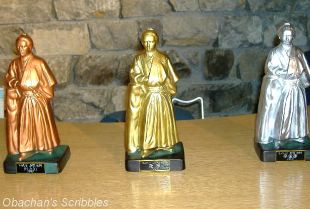
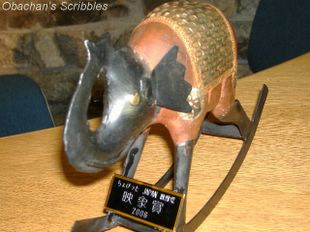
Hence, the mascot of this film fes was an elephant, named Eizo-kun.
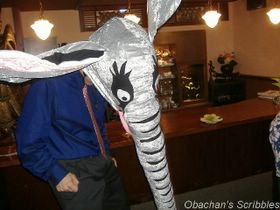
And just like other community events held in Japan, ecology-consciousness was required.
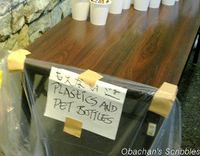
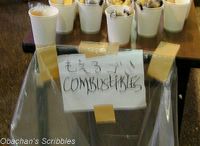
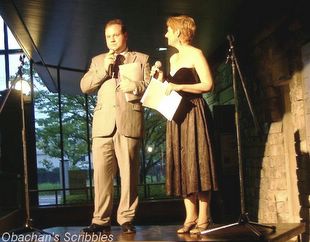
The host and hostess of the ceremony.
The audience enjoyed watching 13 videos/slideshows, and voted for the three most favorites. The votes were counted while the audience was taking a break, then the awards were given to the winners.
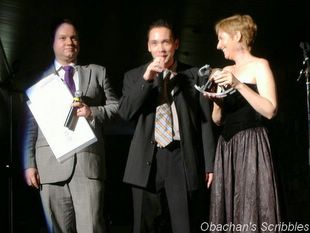

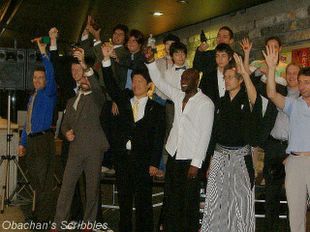
All the participants
And of course, the ceremony was followed by a big party.
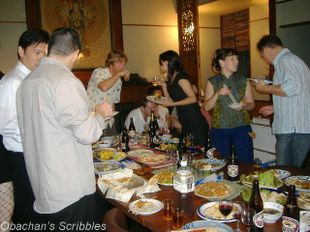
As they mentioned in the speech at the ceremony, there seemed to have been several areas needing improvements. But overall, I thought it was successful and the audience enjoyed watching the videos/slideshows very much. I cannot speak for all, but I guess the audience appreciated the common message form all the entries we saw that night, which, I think, was, “I love this place. Please don’t lose all the good things you have here now.”
Of course there is no quick and easy answer regarding “how” -- how we can keep all the beauty of the nature and warmth and laid-backness of the people, and at the same time boost the local economy to attract/keep younger generations here and secure good life for the elderly by combining the modern technology and information with our traditions. But maybe because the answer is not easy and lots of struggles are expected, receiving such a simple and strong message from people from different backgrounds can be so touching and encouraging.
There is another reason why I like participating in that kind of multicultural event. To me, that is where I don’t have to feel the pressure of having to belong to “either A or B.” Maybe this doesn't make much sense to you readers, but this post will be terribly long if I start elaborating, so I'll write about it some other time.
Anyway, now I’m awfully tempted to make my own chobitto slideshow about what I love very much in my hometown. I’m crazy about the idea of introducing it to the world in the way that only I can by taking photos, editing them, adding background music, narration and subtitles…!!! It must be so much fun, and therapeutic, too! Hope I'll be able to post the slideshow on this blog.
I wonder if those who submitted works to this film festival would feel like making chobitto film again, when they go back to their home countries, about the things they re-discover in their own culture or things that look differently to them after their stay in Japan or things they had been consciously or unconsciously avoiding before coming to Japan. My personal feeling is that doing so might give us a chance to see the other side of the coin… and even integrate something there (though I don't know exactly what).
Categories: Kochi


